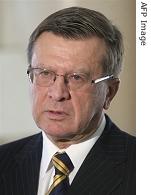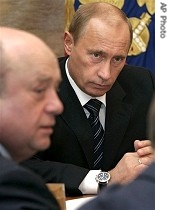2007年VOA标准英语-Russia's President Advances Unexpected Choice f(在线收听)
Moscow
12 September 2007
Russian President Vladimir Putin has accepted the resignation of the entire Russian government, raising speculation that an unexpected choice for new prime minister could also become Mr. Putin's successor in the Kremlin. VOA Moscow Correspondent Peter Fedynsky reports.
Word of Mr. Putin's nominee to become Russia's new prime minister came from Boris Gryzlov, speaker of Russia's lower house of parliament, or State Duma.
 |
| Picture taken 31 May 2006 shows Viktor Zubkov speaking at a conference in St. Petersburg |
In that capacity, Zubkov, who is little known by the public, has investigated financial crimes in Russia. Gryzlov notes that the nominee was also a collective farm director and Communist Party official in the Leningrad region.
Leningrad, Mr. Putin's hometown, is now known by its pre-Soviet name, Saint Petersburg.
Prime Minister Mikhail Fradkov offered his resignation to President Putin in a face-to-face meeting broadcast on national television. Mr. Putin promptly accepted Mr. Fradkov's offer, praising him for growing the economy, raising salaries, and lowering inflation.
 |
| Vladimir Putin chairs a meeting with his Cabinet as Russian Prime Minister Mikhail Fradkov, left, looks on (file photo) |
President Putin's response suggests the new prime minister could also assume the presidency.
The Russian leader says, "Perhaps together, we should all think how to structure the government and leadership so that it better corresponds to the pre-election period and prepares the country for the period after the parliamentary and presidential elections"
Mr. Putin's spokesman, Dmitri Peskov, told the VOA the resignation did not come as a surprise.
The resignation of any government can always be expected, says Mr. Peskov. Sooner or later it happens.
Russian political analysts have long considered Sergei Ivanov and Dmitri Medvedev, both first deputy prime ministers, as favorites for the prime minister's position.
But Andrei Kortunov, head of the Eurasia Foundation in Moscow, says Mr. Putin has been a master of surprise decisions. Kortunov says Zubkov would be, what he calls, a technical president who could leave the door open for Mr. Putin's eventual return as Kremlin leader.
Zubkov, says Kortunov, does not have his own power base, he is about 66 years old, has no personal political ambitions and Putin knows him personally from the St. Petersburg mayor's office. So, according to Kortunov, there is logic to the choice.
The Russian constitution prohibits its president from serving more than two consecutive terms in office. This forces Mr. Putin to step down next year, but he may run again in 2012. Russia holds its next presidential election in March.